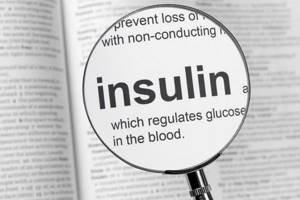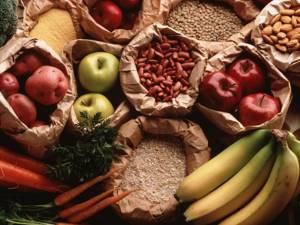Does insulin affect weight?
Insulin plays a role in regulating blood sugar levels and converting food energy into fat. Insulin also helps break down fats and proteins and stimulates muscle, fat and liver cells to absorb glucose during digestion. Cells either use this glucose for energy or convert it into fat for long-term storage. Eating more calories can lead to excess glucose levels. If cells do not extract glucose from the blood, the body will store it in the tissues as fat. When a person receives insulin as treatment for diabetes, their body may absorb too much glucose from food, leading to weight gain. If diabetes is left untreated, it can cause weight loss because the body does not properly convert food into energy. Taking insulin solves this problem. This is why people may notice weight gain when they start taking insulin.
Low carb diet
Of the three main components required to ensure human life, it is carbohydrates that are completely responsible for the formation of the hormone. Therefore, a nutritional system with a relatively small amount of carbohydrates becomes one of the effective methods that help not only lose weight, but even overcome the onset of diabetes.
Two weeks of such a diet are enough to most effectively reduce the amount of the hormone and increase overall insulin sensitivity.
Be sure to read: What is a super diet? Principles of weight loss and menu
If you follow a well-thought-out low-carbohydrate diet, it will be possible to reduce increased body weight, reduce the amount of fat, and normalize your waist circumference. In addition, such a diet normalizes cholesterol levels in the blood and automatically normalizes blood pressure. All this proves the high effectiveness of the diet in relation to the hormone.
Overweight and diabetes
Weight gain is a common symptom of diabetes and other insulin-related diseases. Compared to people who don't have diabetes, people with type 1 diabetes have a higher risk of developing overweight or obesity. The World Health Organization (WHO) estimates that 90% of people with type 2 diabetes are overweight or obese.
People who have diabetes may experience weight gain as a side effect of insulin therapy. While insulin regulates glucose levels, it also increases fat storage. Losing excess body weight can help people manage diabetes symptoms and even reverse prediabetes and insulin resistance.
People who take insulin may experience weight gain, but they should not stop taking insulin or skip doses, as this can cause complications.
Apple vinegar
Quality apple cider vinegar is an ideal addition to any diet or simple healthy eating routine. This is important when it comes directly to effective cleansing of the body and rapid weight loss.

According to statistics, apple cider vinegar is a unique remedy in all respects, designed to prevent sudden changes in the amount of insulin and total sugar.
A couple of years ago, scientists proved that the feeling of satiety is also directly related to the recorded level of acetic acid. It has been proven that various types of pickled vegetables and fermented foods are ideal for a healthy, nutritious diet, and therefore for effective weight loss.
Tips to avoid weight gain
Calorie counting
People with diabetes try to eat less carbohydrates. However, it is just as important to track your overall calorie intake. Eating too many calories can lead to excess blood glucose levels and increased fat storage. Portion control and food journaling can prevent a person from consuming more calories than their body needs. Over time, people learn what portion sizes work best for them and no longer need to measure and track their food intake.
Regular training
Regular exercise keeps the body healthy and strong. They also help burn calories, regulate blood glucose levels and promote fat burning. WHO recommends that adults aged 18 to 64 get at least 150 minutes of moderate-intensity exercise each week. A recent review suggests that exercise can provide significant benefits for people with insulin resistance and type 2 diabetes.
The doctor's consultation
The researchers believe that “there is no one-size-fits-all eating pattern for people with diabetes, and meal planning should be individualized.” Dietitians can advise people on what foods they should eat and what they should avoid. They will also help you develop personalized meal plans.
Doctors can advise patients on ways to improve their health while reducing their risk of developing diseases such as diabetes, obesity and cardiovascular disease. Doctors can check your glucose and insulin levels and their lipid profiles. These laboratory methods can give people insight into their overall health.
Food
Certain foods may help prevent weight gain. High-quality, unprocessed foods contain less sugar and fat. These foods increase your feeling of fullness and help you avoid overeating.
TYPES OF MOTOR ACTIVITY
There are two main types of physical activity in humans: long-term low-intensity (walking) and short, high-intensity (sprinting, strength training). Different substances are used for different activities, i.e., when walking, fats are burned, and when accelerating, carbohydrates are burned.
All the numerous problems begin with the incorrect use of “fuel”, for example, in situations when you need to burn fat, you burn carbohydrates, and when you need carbohydrates, you burn fat. Therefore, two people after the same load can feel completely different, since they work on different substances.
An important lever that switches these situations is the hormone insulin. If the level of the hormone is high, then it switches to carbohydrates, and if it is low, then to fats. You will not be able to change this situation, no matter how much you wish, under any circumstances.
Switching from one source to another is called metabolic flexibility. When a person is unable to switch fats to carbohydrates, a condition called carbohydrate craving occurs.
Modern nutrition and lifestyle have several main problems:
- Too little sustained low-intensity activity. This type includes all types of movement, with the exception of sitting, lying and eating.
- Oversaturation of the body with carbohydrates. At first glance, the consumption of carbohydrates seems quite insignificant, but the fact is that most of them are high-carbohydrate (all flour products, cereals, etc., i.e., where starch is present, carbohydrates make up about 70-80% ).
But you shouldn’t strictly limit yourself from eating carbohydrates either, because the lower safe limit of carbohydrates is about 600 calories or approximately 150 grams of net carbohydrates.
If you practice less than this amount, then the effect of stealing occurs. The brain, of course, will find something to produce the required amount of carbohydrates from, but as soon as you exert yourself a little, the muscles, kidneys, and liver will immediately begin to rob the brain. This is the dilemma that arises, so try to always stick to the “golden mean”.
Symptoms
It is difficult not to notice the increased production of insulin in the body, as it immediately affects well-being and is manifested by the following symptoms:
- chronic fatigue syndrome;
- depressed state;
- heavy sweating during sleep and even minor exertion;
- constant feeling of hunger;
- memory impairment;
- dyspnea;
- muscle pain (not related to sore throat), leg cramps;
- change in skin and hair type: they become oily.
If you do not pay attention to these symptoms and do not take measures to improve your well-being, it will quickly worsen:
- insomnia will appear;
- the pressure will begin to jump;
- problems in the functioning of the kidneys are discovered - urination will become more frequent;
- in a number of cases, gangrene of the legs was diagnosed.
MORE ABOUT: Human genetically engineered insulin isophane, instructions

Many studies have also confirmed that insulin and belly fat are linked as a causative factor and an effect. The more this hormone the pancreas produces, the faster the waist blurs and the sides increase in volume, and uncontrolled weight gain occurs.
Refusal of fast carbohydrates

Modern refined foods, filled with fast, unhealthy carbohydrates, are a major part of proper nutrition for most people. You should definitely avoid such harmful products.
Eating fast carbohydrates can lead a person to quite serious disruptions in the body.
Be sure to read: How to lose 30 kg as quickly as possible?
When consuming them, increased volumes and dangerous insulin insensitivity cannot be avoided. At the same time, refined carbohydrate products have a fairly high level of glycemic index.
GI is a special scale that measures the ability of any product to have a direct effect on overall sugar levels and the development of diabetes. To effectively avoid this, you need to remove all possible sweets and homemade baked goods from the menu. These products can be effectively replaced with plain fruits.
Main function of beta cells
Beta cells are capable of secreting the hormone insulin; thanks to insulin, glucose concentration is regulated. If the functioning of the organ is disrupted, diabetes mellitus sooner or later develops due to a lack of the pancreatic hormone insulin. Doctors and scientists around the world are puzzled by the problem and are trying to understand all the intricacies of hormone synthesis to regulate the process.
Insulin, like its predecessor proinsulin, is first secreted by beta cells and then transported to the Golgi complex, where it is further processed. Inside this complex, designed for the accumulation and production of various substances, C-peptide is released.
As a result, insulin appears, then it is packaged into secretory granules, in them:
- it accumulates;
- persists until the onset of hyperglycemia.
As soon as sugar rises, there is a need for insulin, with the help of beta cells it is released into the blood.
It happens that the patient eats food rich in carbohydrates, then the pancreas is forced to work harder, which causes depletion of the organ and the onset of diabetes mellitus. The problem is typical for people of any age, but elderly patients are most often affected.
With further abuse of sweets, confectionery and flour products, diabetes and metabolic disorders worsen, and severe complications of the disease occur.
Causes of hyperinsulinism
Hyperinsulinism can occur due to a number of provoking factors:
- high-carbohydrate, sweet foods, frequent snacking, lack of a meal schedule, overeating, predominance of simple carbohydrates in the diet;
- high-intensity training or physical inactivity;
- tumor in the pancreas (insulinoma);
- prolonged fasting;
- tocopherol deficiency;
- constant nervous tension, depression, severe stress;
- diabetes;
- infections;
- taking hormonal medications;
- pregnancy;
- disturbance of carbohydrate metabolism;
- improper functioning of the adrenal glands;
- liver diseases.
To find out the cause of hyperinsulinism, you will have to undergo an examination and take the necessary tests. Independent identification and elimination of provoking factors is not allowed, since unprofessional interference with hormonal levels is fraught with complications.
A sedentary lifestyle is a direct path to increased sugar levels

It was already mentioned above that in order to rapidly reduce the overall insulin level, it is advisable to introduce the most effective, regular exercise into your daily regimen. If this is not possible, if the patient has a sedentary job, it is worth introducing at least minimal activity. It is absolutely not necessary to visit the fitness center; it is quite enough to take light walks and do small warm-ups from time to time.
Fiber in the diet

Fiber is an element that is often lacking in the human body. By starting to eat foods filled with fiber, you will be able to lose weight without much effort. How does fiber “work”? The main positive effect of this element is based on its ability to absorb water and the ability to transform into a kind of gel during digestion. It effectively slows down the movement of food through the stomach and intestines. This reduces the feeling of increased hunger and completely maintains the required insulin level. If you want to fill your diet with fiber, you should add such healthy foods to your menu as:
- Green smoothies with all kinds of berries and seasonal fruits;
- Various whole grain products. They need to replace ground and mechanically cleaned ones;
- A varied array of vegetables;
- Legumes are good for the body, as well as nuts and flax seeds.
Fiber-filled foods can reduce the amount of insulin in the blood, quickly strengthen and restore the functioning of the heart and blood vessels, and improve the functioning of the gastrointestinal tract.
How can the negative effects of insulin therapy manifest themselves?
Despite the importance of using the hormone, there are some dangers of administering insulin. So, for example, some patients observe a good effect from the administration of the medicine, using it for more than one year, while others may complain about the development of various allergic reactions. In this case, an allergy can occur not only to the active ingredient, but also to other components of the medication. In addition, as a result of constant injections, the problem of how to get rid of lumps or lumps may arise.
How dangerous is insulin, what side effects can occur after insulin administration? The most common negative effects from insulin therapy include:
- The occurrence of allergic reactions at the site where the injection is given. It can manifest itself in the form of various redness, itching, swelling or inflammatory processes.
- There is a possibility of developing an allergy as a result of hypersensitivity to one of the components of the drug. The main manifestations are skin diseases and the development of bronchospasm.
- Individual intolerance to the drug as a result of prolonged hyperglycemia.
- Vision problems may occur. As a rule, insulin causes side effects that are temporary. One of the main measures is to reduce any strain on the eyes and ensure peace.
- In some cases, the human body is able to produce antibodies in response to the administration of a drug.
- During the first time after starting to take insulin, the danger of insulin may be the appearance of severe swelling, which goes away within a few days. Edema may occur due to a delay in the body's excretion of sodium. As a rule, patients who have been using the drug for many years do not encounter this problem.
If insulin medications are administered, side effects may occur as a result of interactions with other medications. To ensure that side effects do not occur when taking insulin, the use of each new drug must be coordinated with your doctor.
When using insulin, side effects of the drug may not appear only if the patient strictly adheres to all the doctor’s recommendations.











